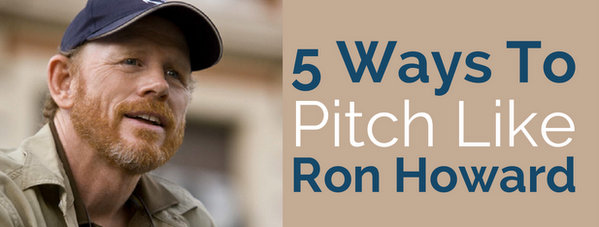
Ron Howard gave an interview at USC where he explained to a group of film students about how he makes movies, specifically about his philosophy of collaboration.
Much of the interview is Howard talking about how he pitches ideas in meetings in order to get decision-makers excited and bring them on board.
Five strategies Used By Ron Howard
1. Ask Good Questions
If you can ask the right questions… not only do they begin to understand what you see in the story, but you begin to see what other people are seeing…. I have found that the less I try to force or enforce everything I felt when I initially read the script… and the more I begin to say, ‘Here’s what I think is possible, what do you think is possible?’ It opens up a dialog that is so fruitful. (3:48)
When you’re in the Q&A stage of the meeting, typically you’re the one answering questions. However, as Howard points out, there is also value in asking questions: it shows respect for the decision-maker’s point of view, and you may get some useful feedback as well.
2. Create An Open Environment
You have to create an environment where people feel safe talking. [People] can so much more readily accept that their idea has been rejected if they honestly believe that there’s an environment where good ideas are embraced…. I try to really create an environment where a better idea can emerge and then I try to be ready to grab it. (5:22)
While it’s true that you have to be willing to fight for your vision, almost all scripts change in accordance with the needs of production. Being open to better ideas shows a professional understanding of how the development process works.
3. Bring Other People On Board
I called it the ‘six of one, half a dozen of another’ rule. If somebody comes up with an idea that they own… if the objective can be fulfilled through their approach… they own that. Their execution is going to be pure. Otherwise, they’re doing what you’re telling them…. When somebody comes up with an idea that does meets the objective, they’re thrilled and will be on your side…. (8:09)
If you can use one of the decision-maker’s ideas, you can convert the decision-maker from a passive listener into an active participant.
4. Engage Agents And Other Gatekeepers
Engaging agents, getting excitement behind your ideas means so much [because] they influence studio executives and the people who make decisions. They are also, intelligent, passionate people. They have a slightly different agenda in that they really have to think of the economics…. You just have to realize that for them, a ‘Yes’ is always a career-threatener. No one is fired for a ‘No.’ Even if they let a great movie go, it’s always the safest answer. Now they have to come up with a few ‘Yes’s’ or eventually they’ll get fired, so they do need to finally say ‘Yes’ to something, very very carefully and very very reluctantly…. (10:47)
It’s important to understand that while agents and executives look at your material from a business perspective, they can give you valuable feedback. Remember the standard that they are applying: “Am I going to stake my career on this project?”
5. Tell Your Story Simply
[Agents] want to know who could be in it, what the genre is, the quick hits of what your take is…. Not a bad exercise, organizing those things. Not a waste of time for you to figure out how to be able to tell your story simply. (19:02)
Your short pitch is what your agent wants to hear first—your 1-3 sentence summary.Make sure you have tested and honed your short pitch before meeting with your agent, manager, or any other decision-maker.
Howard’s Approach Uses “Pull” Instead of “Push”
Instead of trying to force or “push” his ideas into the minds of other people, Ron Howard uses “pull.” He gets decision-makers excited, asks good questions to draw out their creativity, and incorporates their feedback.
He turns listeners into collaborators, partners, and allies. You can, too.
Source: Good in a Room

